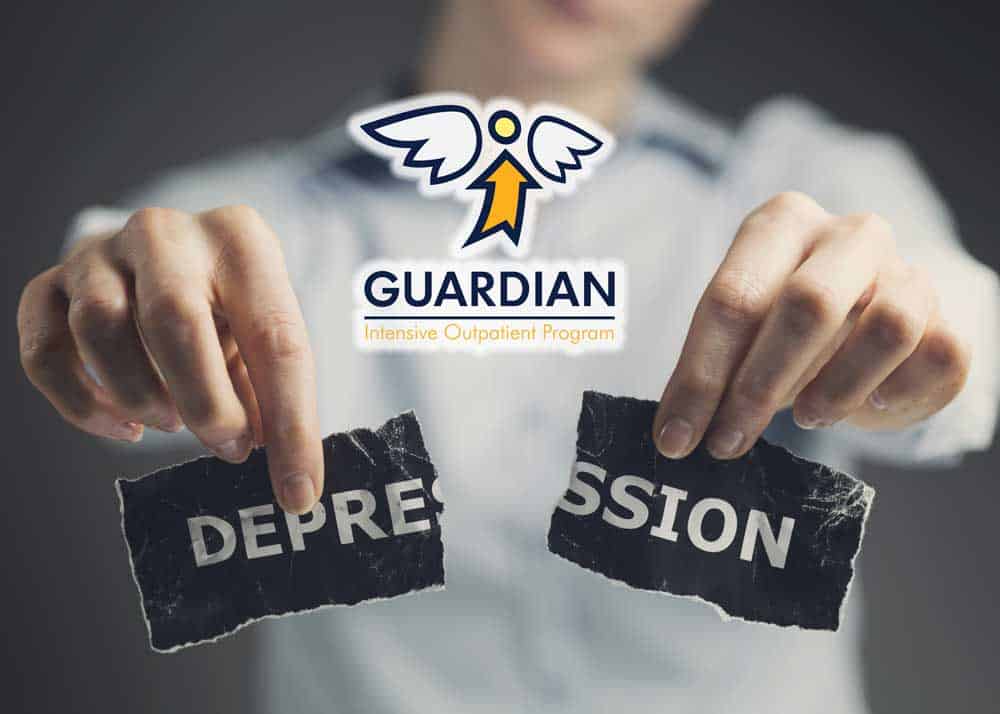Co-Occurring Disorders
Treating Depression & Addiction Simultaneously
Treating Depression & Addiction Simultaneously
Depression and addiction are two very commonly comorbid disorders — meaning that many people who struggle with depression simultaneously struggle with addiction, and vice versa. The World Health Organization suggests that 264 million men and women over the age of 12 currently suffer from some type of depressive disorder. Depression affects people of all ages, in every demographic, with every personal background. Despite the fact that depression is scientifically recognized as a legitimate, diagnosable mental illness, people who struggle with depression are frequently stigmatized. If you have ever struggled with unshakeable feelings of disillusionment and sadness, you know how frustrating it can be to hear people you love say things like, “Why don’t you just snap out of it?” Or, “Count your blessings. You have so much to be grateful for.” Or, “If you put a little more effort into doing the things you love, you would probably start to feel better. Just get outside and take a walk.”
Depression cannot simply be “walked off” or worked through — it is a chemical imbalance in the brain, one that can only be effectively treated with therapy and, when appropriate, antidepressant medications. Unfortunately, many individuals who struggle with depression fail to seek the professional care they need. Rather than pay a visit to a licensed psychiatrist or therapist to explore potential treatment options, many people turn to drugs and alcohol as a way to combat persistent symptoms. This is called “self-medication,” and this is part of the reason why substance abuse and depression so commonly co-occur. In addition, drugs and alcohol often exacerbate the depression individuals are attempting to combat, creating a vicious cycle.
If you or someone you love has been struggling with depression and addiction, Guardian IOP is available to help. Our comprehensive dual diagnosis treatment program tackles addiction and all underlying issues, providing clients with the integrated healing they need to overcome adversity and go on to lead healthy, happy, fulfilling lives. Contact us today to learn more.
Types of Depressive Disorders
Major Depressive Disorder – This is the most commonly diagnosed depressive disorder, and it is estimated that roughly 16.2 million American adults have experienced a major depressive episode at least once during their lifetime. People who suffer from major depressive disorder experience symptoms associated with depression on a near daily basis.
Persistent Depression – This type of depressive disorder is characterized by symptoms of depression that do not resolve for at least two years. The symptoms can include deep feelings of sadness, feelings of hopelessness, changes to appetite, changes to sleeping patterns, low self-esteem, a lack of energy and a lack of interest in activities that were previously enjoyed.
Atypical Depression – This type of depressive disorder is characterized by symptoms of depression that resolve when a person experiences a positive event. For example, someone who is in the middle of a depressive episode might experience resolved symptoms after getting a new job or entering into a new romantic relationship. However, the symptoms associated with depression come back in time.
Manic Depression/Bipolar Disorder – Manic depression and bipolar disorder are both characterized by periods of mania followed by periods of extreme sadness. In order for someone to be diagnosed with manic depression, he or she must experience a manic episode that lasts for at least 7 days and experience a depressive episode before or after the manic episode.
We Are Here For You
Let Us Help You Heal
Our Drug & Alcohol addiction treatment experience is second to none.
Learn how we can help by speaking with one of our Treatment Advisors today.
Depressive Psychosis – Some people who experience major depressive disorder end up completely losing touch with reality. This is known as depressive psychosis. People who suffer from depressive psychosis might experience auditory and visual hallucinations or suffer from extreme paranoia.
Perinatal Depression – This type of depressive disorder is often referred to as postpartum depression. Women who are pregnant or who have recently given birth might experience symptoms of sadness, anxiety, anger, exhaustion and excessive worry pertaining to the health of their child.
Premenstrual Dysphoric Disorder – Some degree of PMS is normal before menstruating. However, someone who is suffering from premenstrual dysphoric disorder experiences severe depression prior to menstruating. Their level of sadness interferes with their ability to complete day-to-day tasks.
Situational Depression – Situational depression occurs when a person experiences a traumatic or emotionally damaging event. For example, someone might develop situational depression after the death of a loved one, the loss of a job, while going through a messy divorce, experiencing emotional or physical abuse or facing financial insecurity. In most cases the symptoms associated with situational depression resolve when the situation resolves.
Seasonal Depression – Seasonal depression, or seasonal affective disorder (SAD), is depression brought on by the changing seasons. As the winter months begin and the days get shorter and colder, some people fall into a state of depression. They retreat from social situations, sleep more, experience feelings of sadness and hopelessness and often gain weight.
Our Drug & Alcohol Treatment Services Include
Which Comes First: Depression or Addiction?
Because substance abuse leads to lasting emotional consequences, it can sometimes be difficult to determine whether a person struggling with addiction is actually suffering from an underlying depressive disorder, if their depression is caused by their addiction, or a combination of both. Seeking treatment for both simultaneously can be helpful in solving both issues.
General Signs of Depression:
- Feelings of sadness, disillusionment and hopelessness
- A lack of interest in extracurricular activities or social activities that were previously enjoyed
- Changes to appetite and eating patterns, which typically lead to weight loss or weight gain
- Changes to sleeping patterns, typically marked by an increased need for sleep and sleeping more throughout the day
- A lack of energy
- Difficulty concentrating
- Using chemical substances in order to alleviate uncomfortable emotional symptoms
- Experiencing suicidal thoughts and ideations
If you or someone you love has been struggling with addiction and depression, there is help available. Contact us to learn more about how Guardian IOP tackles depression and addiction simultaneously.
Ready To Begin Your Drug & Alcohol Treatment?
We Offer A Safe & Effective Program
Don’t let Drug & Alcohol addiction control your life.
Call us today and let’s get you started on the path to a better you.
Studies on the Link Between Depression & Addiction
There have been numerous studies conducted on the relationship between addiction and depression. Across the board, these studies have consistently highlighted the relationship between the two disorders and the need for dual diagnosis treatment options.
Here are some highlights:
“High rates of depression are common among individuals with alcohol use disorders (AUD), particularly alcohol dependence.” — an article published by the National Library of Medicine.
“Data from the National Comorbidity Survey estimated the lifetime prevalence of major depression to be nearly one quarter (24.3 %) among alcohol dependent men and nearly one half (48.5%) among alcohol dependent women, exceeding the prevalence rates among individuals without AUD. In clinical samples, the lifetime rates of co-occurrence are greater still, ranging from 50 to 70%.” — National Comorbidity Survey
“Researchers have attempted to explain the association between AUD and depressive symptoms in a variety of ways. The pharmacologic effects of alcohol may produce symptoms of depression more or less directly during periods of intoxication and/or withdrawal. Relatedly, laboratory studies have shown that depressive symptoms can spontaneously emerge in the context of heavy drinking and abate with abstinence. Chronic drinking and related symptoms may promote depression indirectly as well, for example by contributing to stressful life circumstances (e.g., partner-relationship disruptions) that in turn are known to promote depression. Other research supports the idea that depressed individuals are motivated to drink in an effort to cope with negative effects, a potential mechanism for development of AUD.” — an article published by the National Library of Medicine
Begin Healing Now!
Have A Call With One Of Our Treatment Advisors
Don’t Suffer Any Longer
Seek Help Today
If you or someone you love has been struggling with addiction and depression, there is help available. At Guardian IOP we have developed a program of dual diagnosis treatment that helps individuals overcome substance abuse and mental illness simultaneously through a combination of individual and group therapy, medication assisted treatment, holistic healing and recovery education. Contact us today to learn more.
Get Started Now
Give us a call 24/7
(888) 693-1894


Reviewed for accuracy by:
Anna Marie Barrett LCSW, CYT
Anna earned her Masters of Social Work at Barry University in Miami, FL in 2017 and completed her internship in co-occurring disorders. Anna has a Bachelors of Art in Religious Studies from Naropa University and is a certified yoga and meditation instructor. Anna has received specialized training in somatic counseling with an emphasis on body-centered psychotherapy.




















